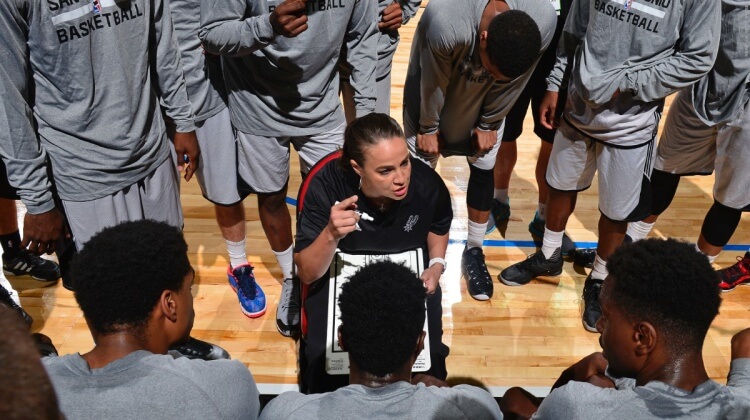Title IX, federal legislation passed in 1972, prohibits discrimination based on sex in education programs that receive federal money (Acosta & Carpenter, 2014, p. 5). Since the law’s inception, girls’ and womens’ participation in sports has increased annually. Today, more females are participating in sports then ever before. In comparison, a notable decline in female coaches has occurred (LaVoi, 2013). In 1972, [approximately] 9 out of 10 coaches for women’s teams were female (Acosta & Carpenter, 2014, p. 10). In 2014, the number has dropped to approximately 4 out of 10. In addition, only approximately 3% of coaches of men’s teams are women (Acosta & Carpenter, 2014).
“Sport is inextricably linked to the American ideal of meritocracy that if you are good enough, work hard enough, and make sacrifices, you will have the opportunity to achieve and succeed. Although this ideology has prevailed for athletes, does this same ideal of meritocracy apply to the coaching profession? Does it apply to all coaches both male and female?” (LaVoi, 2013, p. 1).
It has long been thought that playing experience determined coaching opportunities. But with more girls and women playing then ever before, and yet declining numbers of women in coaching, this long held belief is today being challenged. Interpretation of the data as to why women are not coaching may relate to economic biases, social myths, or personal reasons (Stoll & Van Mullem, 2010, p. 7).

Trailblazer, pioneer — words we use to describe a person who paves the way for new opportunities for others. Becky Hammon is a trailblazer and a pioneer. A 16-year veteran in the Women’s National Basketball Association (WNBA), Hammon spent 8 years with the New York Liberty and 8 years with the San Antonio Stars (Voepel, n.d.). A decorated athlete, she was a seven-time WNBA All-Star, two-time All-WNBA First Team honoree and three-time NCAA All-American [at Colorado State University] (Voepel, n.d).
Hammon’s transition to coaching occurred during the 2013 season. While rehabilitating a knee injury, she spent the season working in the San Antonio Spurs organization of the National Basketball Association (NBA), participating in practice and film sessions. Upon her retirement from the WNBA, Hammon signed a contract with the San Antonio Spurs to become the first full-time female National Basketball Association (NBA) assistant coach in history (Armour, 2014).
Credited with having a savant-like basketball IQ(Armour, 2014), Hammon’s skills and knowledge of the game have been recognized and applauded by others in the profession (Armour, 2014; Lieberman, 2014). The argument that basketball is basketball has been echoed before. For example, Coach Rick Pitino, the head men’s basketball coach at the University of Louisville, shared, to say a woman can’t coach men is as silly as dismissing someone who didn’t play the game in college or in the pros. It really has nothing to do with playing ability: It has to with understanding the game of basketball (Armour, 2014). Hammon’s communication style and ability to connect with people has been applauded (Armour, 2014; Lieberman, 2014) and she has had an opportunity to showcase her skill set with a head coach who recognizes that game knows game. The fit was right, the timing was right, and now history has been made.
“Women coaches matter in many ways. [If] societal stereotypes about gender and leadership, that privilege male coaches are to change, male and female athletes need to be coached by women. Exposure to female role models and leaders in a context that matters to young people (e.g., sport) may help to change values and beliefs about women in positions of power and leadership (LaVoi, 2013, p. 2)
Why does Becky Hammon’s appointment to the San Antonio Spurs coaching staff matter? It matters to her personal aspirations, career growth, and resulting impact on others. She will be able to share her competitive experiences and understanding of the game with other athletes, both male and female, to help them improve and reach their potential (Lieberman, 2014). Her appointment to the San Antonio Spurs coaching staff matters because she will continue to serve as a role model. She is forging a pathway that other women can follow. She is creating a reality that young girls can dream about. Becky Hammon is a trailblazer, a pioneer. Her appointment directly challenges the gender stereotypes about sport and leadership (LaVoi, 2013) highlighting that knowledge and ability is key.
References
- Acosta, V. & Carpenter, L. (2014). Women in intercollegiate sport: A longitudinal, national study, thirty-seven year update, 1977-2014.
- Armour, N. (2014, August 11). Becky Hammon on being Spurs assistant coach: ‘Why couldn’ I be the first?’. USA Today.
- LaVoi, N. M. (2013, December). The decline of women coaches in collegiate athletics: A report on select NCAA Division-I FBS institutions, 2012-2013.
- Leiberman (2014, August 7). What it’s like for a woman to coach men’s professional basketball. Time.
- Stoll, S.K. & Van Mullem, H. (2010). Women coaching women: A model for sports(wo)manship? National Association of Girls and Women in Sport Inclusion and Social Justice Paper Series.
- Voepel, M. (n.d.). Hammon through the years.
